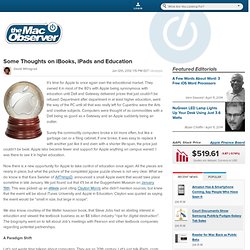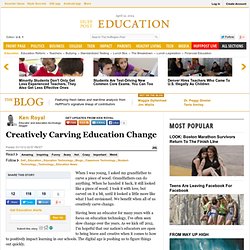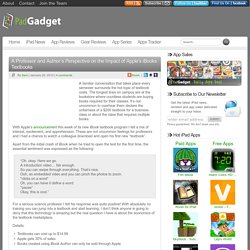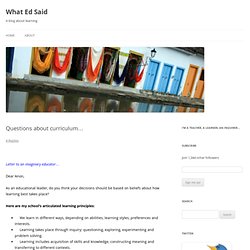

Coursera.org. iPad for Teaching & Learning. Some Thoughts on iBooks, iPads and Education. It’s time for Apple to once again own the educational market.

They owned it in most of the 80’s with Apple being synonymous with education until Dell and Gateway delivered prices that just couldn’t be refused. Department after department in at least higher education, went the way of the PC until all that was really left for Cupertino were the Arts and creative subjects. Computers were thought of as commodities with a Dell being as good as a Gateway and an Apple suddenly being an outlier. Surely the commodity computers broke a lot more often, but like a garbage can or a filing cabinet, if one broke, it was easy to replace it with another just like it and even with a shorter life-span, the price just couldn’t be beat.
Apple labs became fewer and support for Apple anything on campus waned. Now there is a new opportunity for Apple to take control of education once again. A Paradigm Shift Let’s not waste time talking about computers. The Revision Cycle. Tablets Will Transform the Classroom [OPINION] Neil Johnston is managing director at Store Van Music.
![Tablets Will Transform the Classroom [OPINION]](http://cdn.pearltrees.com/s/pic/th/tablets-transform-classroom-127984962)
Neil is an award winning young entrepreneur and composer who specializes in a breakthrough link between the music industry and education. You can find out more about his pioneering work by following him on Facebook and Twitter. Apple released the original iPad to consumers in April 2010, sparking the tablet computer frenzy that we see in full-swing today. Twenty-one months later, we're facing the potential launch year of the much-rumored iPad 3, not to mention numerous competitor tablets from all of the major device manufacturers.
Alongside these changes, forward-thinking educators are taking risks by distributing tablets in schools, in the hopes that the glimpses of efficiency we have seen to-date can continue to evolve for the long-term, changing classroom education for the better. Many schools across the world are well on their way to integrating tablet technology into their daily routines. My answer would be enormously.
Ken Royal: Creatively Carving Education Change. When I was young, I asked my grandfather to carve a piece of wood.

Grandfathers can do anything. When he handed it back, it still looked like a piece of wood. I took it with love, but carved on it a bit, until it looked a little more like what I had envisioned. We benefit when all of us creatively carve change. Having been an educator for many years with a focus on education technology, I've often seen slow change over the years. A few months back, I attended Dell's first Education Think Tank in NYC. We all have contributions to how we can "carve" out pieces. Paperless? I read an interesting blog post by a tech-savvy educator, who was getting rid of obsolete classroom tools. If you're like me, you can key a paragraph quicker than pen your name, so should students learn cursive handwriting or not?
Some think paperless means no paper at all, but less paper is probably more accurate -- printer companies won't argue. Students and Social Media -- Risky Business? A Professor and Author’s Perspective on the Impact of Apple’s iBooks Textbooks. By Sam | January 20, 2012 | 4 comments A familiar conversation that takes place every semester surrounds the hot topic of textbook costs.

The longest lines on campus are at the bookstore where countless students are buying books required for their classes. It’s not uncommon to overhear them declare the unfairness of a $200 textbook for a business class or about the class that requires multiple books. With Apple’s announcement this week of its new iBook textbook program I felt a mix of interest, excitement, and apprehension. These are not uncommon feelings for professors and I had a chance to watch a colleague download and open his first new “textbook”. Apart from the initial crash of iBook when he tried to open the text for the first time, the essential sentiment was expressed as the following: “Oh, okay.
Questions about curriculum. Letter to an imaginary educator… Dear Anon, As an educational leader, do you think your decisions should be based on beliefs about how learning best takes place?

Here are my school’s articulated learning principles: We learn in different ways, depending on abilities, learning styles, preferences and interests. Learning takes place through inquiry: questioning, exploring, experimenting and problem solving. I have a few questions for you to consider: What are your beliefs about learning?
Did you know that a curriculum should not be static, but constantly revisited and updated to be current, relevant and promote authentic learning? Do you think a curriculum has to be a set of books with prescriptive instructions for teachers? Are you aware that workbooks do not usually foster meaningful learning? Do you realize that teachers are capable, thinking human beings and don’t need prescribed programs in order to teach? Have you ever asked students about what engages them and how they learn best?